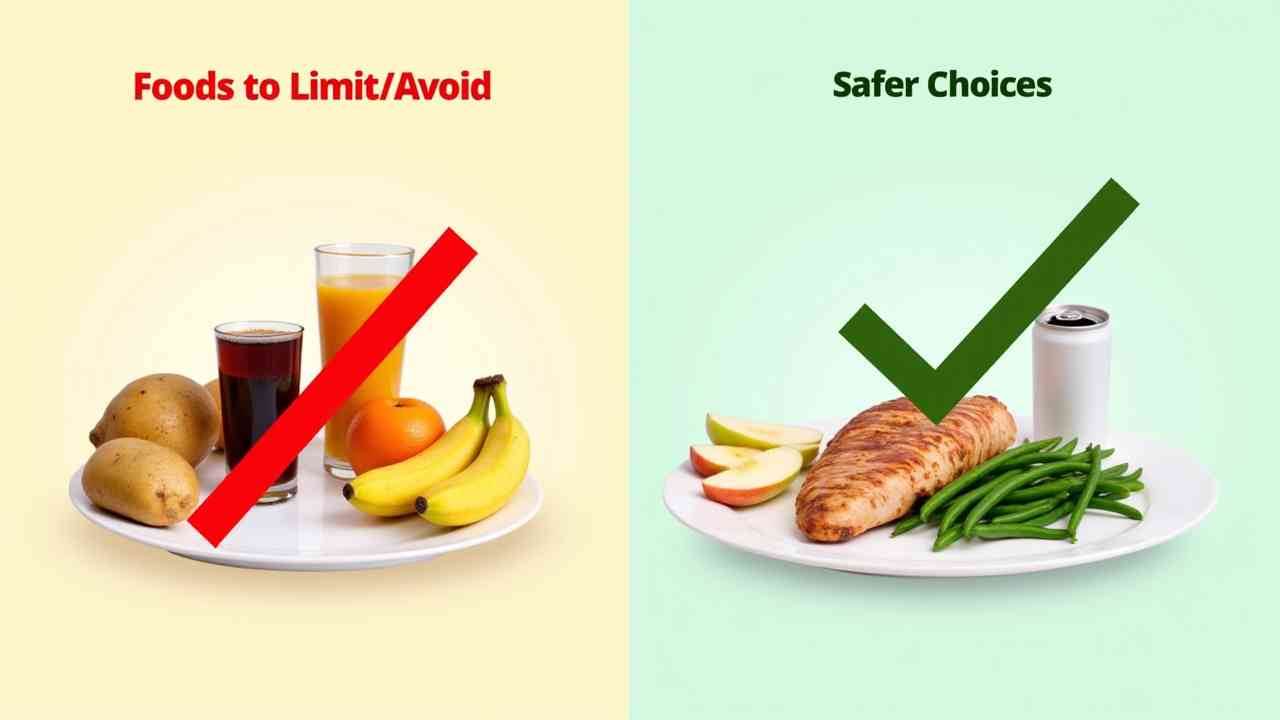
🩺 A Diet Guide for Diabetic & Renal Patients (What Can You Eat?)
🩺 A Medical Guide to the Diabetic and Renal Diet 🩺
❗ CRITICAL MEDICAL WARNING: A diet for people with both diabetes and kidney disease (a diabetic renal diet) is one of the most complex and restrictive medical diets. It must be managed by a team of healthcare professionals, including a nephrologist (kidney doctor), an endocrinologist, and a renal dietitian. This guide provides general principles and is NOT a substitute for a personalized medical plan.
Being diagnosed with both diabetes and chronic kidney disease (CKD) means you face a dual challenge. You need to manage your blood sugar levels while also protecting your kidneys from further damage. The diet for diabetics with a renal condition is a careful balancing act, but it is the most powerful tool you have for managing your health.
This guide will explain the core principles of this diet. Let's explore this important health topic. ✅
🤔 What is the Core Philosophy of a Diabetic Renal Diet?
The core philosophy is a careful balance. You need to achieve two goals at the same time:
- Control Blood Sugar: This is the diabetes management part. It involves monitoring your carbohydrate intake.
- Reduce Kidney Workload: This is the renal management part. It involves strictly limiting your intake of sodium, potassium, and phosphorus. It also involves controlling your protein intake.
These two goals can sometimes conflict, which is why working with a dietitian is essential.
- What Are the Key Nutrients to Manage?
A successful diet requires you to be a mindful eater and a careful label reader. You will be focusing on these key nutrients:
- Carbohydrates: Choose high-fiber, low-glycemic options in controlled portions to manage blood sugar.
- Protein: You will need to eat a specific amount of protein—not too much and not too little. Too much protein can strain the kidneys, but too little can be unhealthy for a person with diabetes.
- Sodium: Limiting sodium is crucial for controlling blood pressure and fluid balance.
- Potassium & Phosphorus: Damaged kidneys cannot filter these minerals properly, so they must be limited in your diet.
✅ What Foods Can Diabetics on a Renal Diet Eat?
Your dietitian will give you a detailed list. The focus will be on fresh, home-cooked foods. Here are some generally "safer" choices.
- Protein (in moderation): Egg whites, grilled chicken, and fish.
- Low-Potassium Vegetables: Bell peppers, cucumbers, cauliflower, and green beans.
- Low-Potassium Fruits: Apples, berries, grapes, and plums.
- Kidney-Friendly Grains: White bread and white rice are often recommended over whole grains because they are lower in phosphorus and potassium.
🚫 What Foods Must Be Strictly Limited or Avoided?
This is the most critical part of the diet. Many "healthy" foods for diabetes are very unhealthy for a renal patient.
- High-Potassium Foods: Bananas, oranges, potatoes, tomatoes, and avocados.
- High-Phosphorus Foods: Dark-colored sodas (colas), dairy products (milk, cheese, yogurt), nuts, and processed meats with phosphate additives.
- High-Sodium Foods: Canned soups, fast food, processed meats, and most packaged snacks.
- Sugary Foods & Drinks: Candy, regular soda, and desserts must be avoided to control blood sugar.
The cool, crisp autumn weather is a perfect time to start cooking warm, simple, and kidney-friendly meals at home. A dish of roasted chicken with a side of steamed green beans is a perfect example. Working closely with your healthcare team is the only way to safely manage a diet for diabetics on a renal diet. 🩺